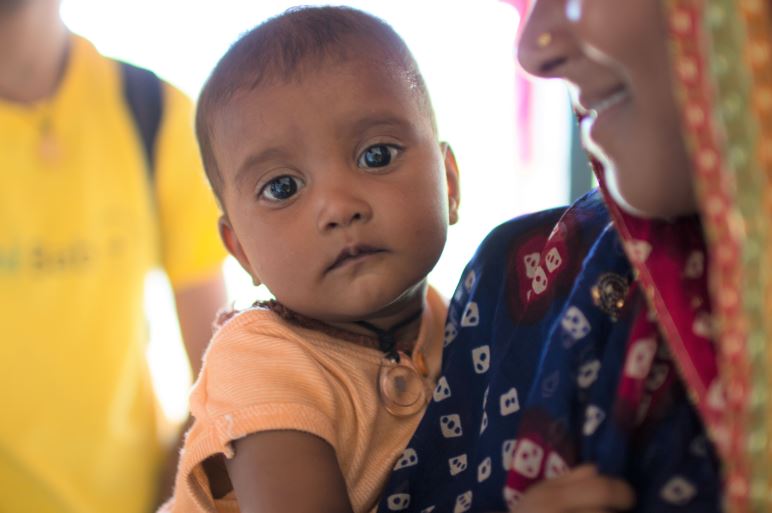
Improving government health services and data collection in Rajasthan, India

Context
Vaccine-preventable conditions put 9.4 million children across India at risk of death or disease each year, making expanding and deepening immunisation an urgent priority. According to the 2015–2016 National Family Health Survey, less than half of the children in Rajasthan’s Udaipur district got all of their vaccine shots.
In response, 3ie supported US-based non-profit Khushi Baby to implement and evaluate a new mHealth system in five rural blocks in Rajasthan’s Udaipur district, in partnership with the state’s health department. Treatment areas were the catchment areas of the rural health outposts or sub-centres where the Khushi Baby system was implemented.
The Khushi Baby system included multiple components aimed at frontline workers and caregivers. Mothers who had just delivered a child received a wearable digital health record for infants, designed to resemble a traditional amulet. Frontline health workers received tablets with biometric verification and an Android application for scanning the pendants and entering data on immunisations and other health indicators for mothers and children.
The system sent automated voice-call reminders in the local dialect about the immunisation schedule to the participant caregivers. It also enabled the Khushi Baby team and health officials to track maternal and child health data through online dashboards.
Evidence
The cluster randomised trial of the Khushi Baby system found that it had a significant positive impact on the immunisation rates of infants. By the end of the two-year evaluation in 2018, children in the treatment areas were 1.66 times more likely to be fully immunised than those in the control areas, which used only the existing paper-based maternal and child health tracking systems. The cost per 10 percentage point increase in the likelihood of full immunisation was US$0.68 (INR 50) per child.
Testimonies from frontline health workers in the treatment arm indicated they were satisfied with the intervention and perceived it to be the cause of improved beneficiary attendance at health camps. However, the evaluation found no decreases in hospitalisation, decreases in infant mortality rates or increases in the retention of children’s health records.
‘… if we work in collaboration with the health structure and we try to understand the requirement of that system. and then we make our process and formulate the things, and then after identifying those gaps we put in our evidence to fulfil those gaps, then I think it is very promising …’ — Dr Sanjeev Tak, deputy director medical and health services, Department of Medical and Health Services, Udaipur division, Government of Rajasthan
Evidence impacts
Type of impact: Inform the design of other programmes
Where findings from the evaluation or review inform the design of a programme(s) other than the one(s) evaluated.
This is one of 3ie’s seven types of evidence use. Impact types are based on what we find in the monitoring data for an evaluation or review. Due to the nature of evidence-informed decision-making and action, 3ie looks for verifiable contributions that our evidence makes, not attribution.
Read our complete evidence impact typology and verification approach here.
Close windowThe Rajasthan government appointed the Khushi Baby team as a technical partner for the government’s new Nirogi Rajasthan scheme, based on discussions of evaluations. Under the scheme, frontline workers were to conduct a state-wide health census, collecting health information using a customised mobile application. Similar to the digital pendants under the evaluated programme, the scheme also envisaged portable digital health record cards for all residents. The government aimed to leverage the data and link health records to improve monitoring and delivery of government health services.
Suggested citation
International Initiative for Impact Evaluation (3ie), 2020. Improving frontline data collection and government health services in Rajasthan, India [online summary], Evidence Impact Summaries. New Delhi: 3ie.
Evidence impact summaries aim to demonstrate and encourage the use of evidence to inform programming and policymaking. These reflect the information available to 3ie at the time of posting. Since several factors influence policymaking, the summaries highlight contributions of evidence rather than endorsing a policy or decision or claiming that it can be attributed solely to evidence. If you have any suggestions or updates to improve this summary, please write to influence@3ieimpact.org